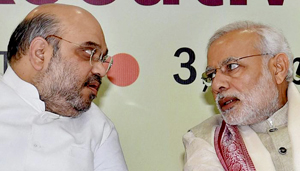New Delhi, Jun 19: Battling a major crisis over Lalitgate revelations, BJP chief Amit Shah discussed with Prime Minister Narendra Modi damage-control measures amid mounting demands for removal of Sushma Swaraj and Rajasthan Chief Minister Vasundhara Raje, who today cancelled her visit to Punjab where she would have come face-to-face with Shah.
Sources said that Shah, who had gone to PM's residence along with a delegation UP farmers last evening, stayed back and had a detailed discussion with Modi. Shah is understood to have discussed possible damage control measures in the wake of fresh disclosures indicating links of Raje and External Affairs Minister Swaraj with scam-tainted former IPL boss Lalit Modi.
The sources said Shah is also in touch with RSS leadership on the issue. While BJP's top leaders have come out in support of Swaraj, they are yet to openly back Raje.
Citing health reason, Raje today cancelled her visit to Punjab where she would have come face-to-face with Shah for the first time since the damaging revelations that she allegedly favoured Lalit Modi's immigration plea in London.
Raje was scheduled to share the dais with Shah and Union Home Minister Rajnath Singh at the function in Anandpur Sahib celebrating 350 years of the key Sikh shrine. "Due to back pain, the Chief Minster's doctor has advised her to take rest so she has cancelled her visit to Punjab today," Raje's press advisor said in Jaipur.
Raje had spoken to Shah over phone on Wednesday to explain her position. Congress has been demanding her immediate resignation along with that of External Affairs Minister Sushma Swaraj, saying they have no right to continue in office after helping the former IPC Chairman who is facing money laundering and other charges.
However, Rajathan Health Minister Rajendra Rathore rejected demands for Raje's resignation, saying the entire national BJP and party MLAs were with her. "The entire BJP be it at the Centre or the state are with her. She has been leading us and will continue to do so. The entire legislature party is standing strongly with her. Our leadership is standing by her. The question of her resignation does not arise," he had said.
Meanwhile, BJP veteran Murli Manohar Joshi extended support to Swaraj and visited her residence here. Joshi spent more than half an hour with her. Swaraj continued her engagements today and called on Tanzania President Jakaya Kikwete, who is currently in India on an official visit.





Comments
Add new comment